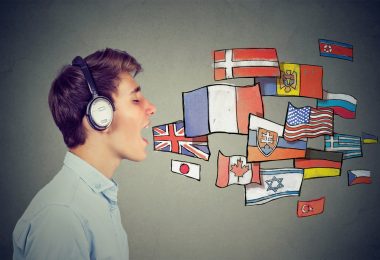
Traveling is the best way to learn more about foreign cultures and traditions. Whether you go to Portugal or India, Morocco or Japan – only those who have actually been to a country can claim to have got to know it!
In order to understand a country and its people – including its history, tradition and way of thinking – one thing is essential: language. Because conversations with the inhabitants of a country reveal and instruct much more than old buildings, more detailed and accurate than all travel guides and blog articles in the world could ever do.
“To speak a language means to adopt a world, a culture.” This beautiful sentence comes from Frantz Fanon. The psychiatrist, writer and politician lived in the 20th century and is considered one of the most important pioneers of decolonization. Decolonization – also known as decolonization – is the transition from colonial rule to state independence. However, this decolonization does not only happen at the political level, at the state level. Decolonization must also be done mentally. The best way to do this is not to look at and judge other countries and cultures from the outside. Instead, a perspective is to be taken that is, so to speak, inside the culture itself.
However, this is only possible if you speak the local language. If we now look at Frantz Fanon’s theorem from this point of view, a whole new meaning opens up: it not only finds the translation of words from one language into another, no, one also adopts their meaning, one translates them into something of one’s own, something familiar. In this way, you familiarize yourself with a culture that would otherwise only remain something unknown, but at best a curiosity.
Travel to learn

“You have to travel to learn,” said Mark Twain, one of the greatest writers of the 19th century. This is certainly true. But the opposite is also true in a certain sense: you have to learn to really travel! Because this is the only way to immerse yourself deeply in the culture, in the identity of a country and its people. Therefore, it makes sense to learn the language of the destination beforehand. Not only that you can talk to the locals later on, have the opportunity to ask them questions. Even before the trip, you can immediately start learning what Mark Twain mentioned! For example: translating literature yourself, watching films in the original language or with translated subtitles, or translating posts in Internet forums and even writing them yourself. There is probably no better preparation for a trip than translating! So you start right away with what is so important during a trip: the transfer of foreign impressions into your own world of thoughts.
“The world is a book and those who do not travel read only one page.” Another sentence that is often quoted when it comes to travel. It comes from Augustine of Hippo, who lived around 1600 years ago. So a lot of time has passed – but the meaning of this statement is still as true today as it was in late antiquity! But now one can also say: Whoever does not translate the Book of the World will not understand even one page! In other words, traveling only makes sense if you also understand what you see, read and hear. After all, reading is only useful if you understand the meaning behind the words. Otherwise, the most beautiful volume of poetry remains nothing but black ink on white paper.
Travel and translation are inseparable. So the motto is: Translate and translate – from one language to another and from one shore, one culture.

